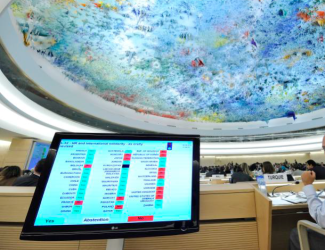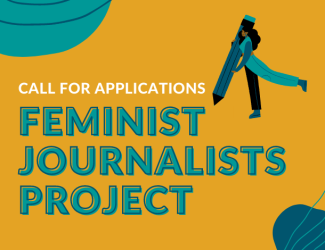COP26: Feminist Perspectives on the Climate Summit and Beyond
You will not be surprised to hear that the fifteen days of negotiations during the COP26 did not lead to the binding climate commitments we need, overlooked gender-responsive climate policies and failed to equitably redistribute resources to ensure just transitions.
Celebrating the Legacy of our Feminist Ancestors
Join AWID’s feminist artist-in-residence Ika Vantiani and Indonesian rapper Yacko for a special live collage workshop and performance event, to celebrate and pay tribute to feminist human rights defenders who are no longer with us. Participants will be guided through creating their own WHRD tribute artwork inspired by a feminist human rights defender of their choosing, while jamming to a curated playlist of feminist music from Indonesia and beyond.
تضامن نسوي مع المجتمع المدني الفلسطيني
بصفتنا مجتمعًا نسويًا عالميًا، نعبّر عن تضامننا الكامل مع منظمات المجتمع المدني الفلسطينية الستّ التي حظرتها إسرائيل ونؤكّد أهمية التحرّر الفلسطيني بصفته جزءًا من النضال النسوي.
للتوقيع الآن
"في الواقع وفي الأساس، لا يمكن للنسوية دعم العنصرية أو الفوقية أو السيطرة القمعية بأي شكلٍ كان."
- مريم البرغوثي
Time to elect 2 bold feminists to join our Board of Directors
Every year, AWID seeks to renew and enrich the perspectives and experience reflected in our Board of Directors by bringing in new members.
What is the Board’s role?
Our Board of Directors is critical to ensuring AWID effectively fulfills its mission to support feminist movements around the world to thrive. Our Board reflects a range of geographies, struggles and perspectives--part of the diversity and strength of feminist movements.
From US $40 Billion to US $2 Billion: unpacking the real numbers behind Generation Equality funding pledges
The Generation Equality Forum (GEF) closed in July with the announcement that US $40 billion was pledged to advance gender equality worldwide. Four months after the GEF, we are still waiting for UN Women to make the full details of funding commitments publicly accessible.
New Primer: Rights at Risk
Civil Society Demands Equitable Access to COVID-19 Vaccines
Joint Statement for the 46th Session of the Human Rights Council Item 3
This joint statement was delivered by IWRAW Asia Pacific, the Cairo Institute for Human Rights Studies and SRI, and endorsed by 71 organizations denouncing vaccine nationalism, the stockpiling of COVID-19 vaccines and the stonewalling of a temporary TRIPS waiver proposal by rich countries.
Key reports & resolutions at the 46th Session of the Human Rights Council
The Human Rights Council (HRC) is the foremost intergovernmental body responsible for the promotion and protection of all human rights around the globe.

AWID is launching a call for participation in a Feminist Journalist Program.
AWID is launching a call for participation in a Feminist Journalist Program.

Pagination
- Previous page
- Page 7
- Next page
2224x1253.jpg)